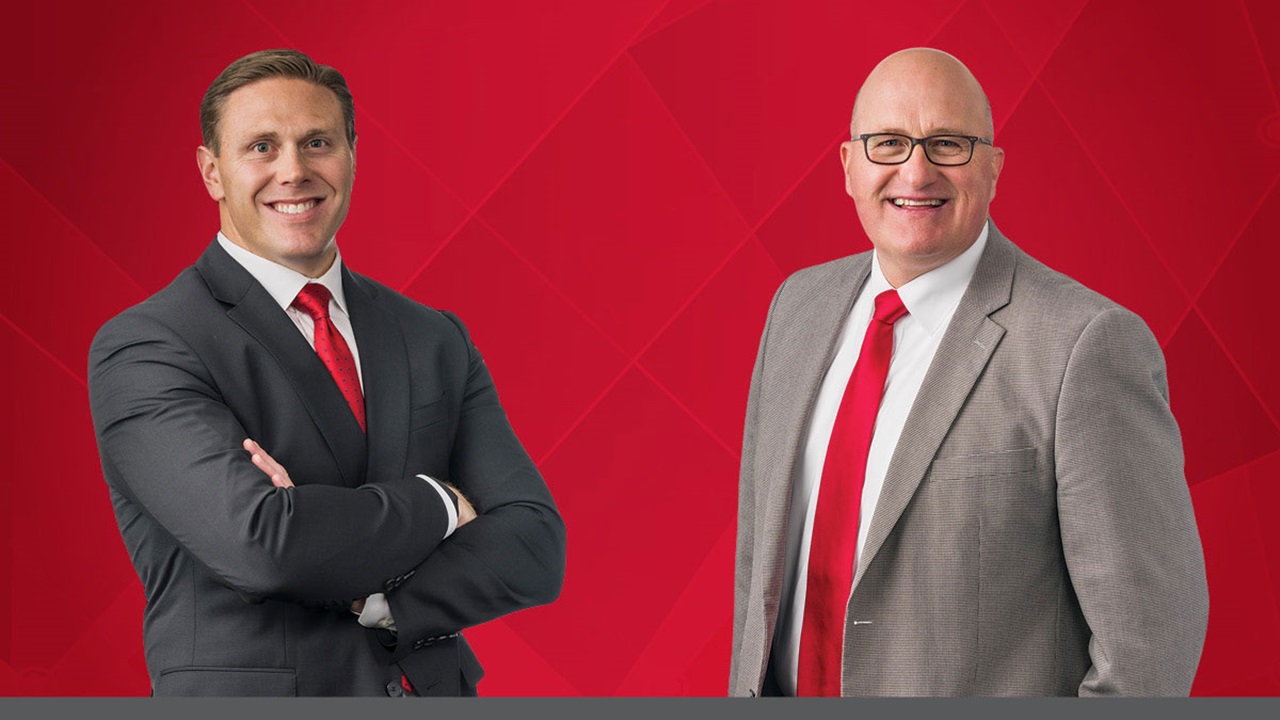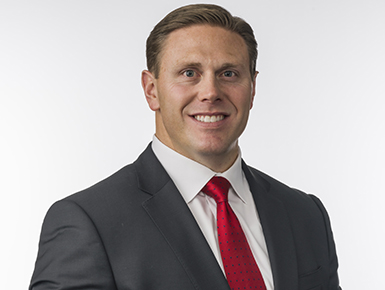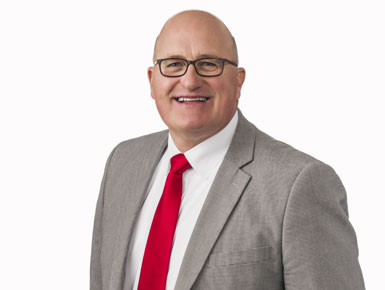The Future of Health Care is USD

They also both agree that USD is the future of health care in South Dakota.
Bill Gassen ’04, ‘08 (Sanford Health) and Bob Sutton ’90, ‘95 (Avera), rely on USD to produce the next generation of health care leaders and fill gaps in workforce needs. This isn’t a one-sided relationship -- USD relies on Sanford Health and Avera to provide clinical experiences, internships and careers that are critical to the development of students.
We asked our leading health care CEOs where they got their degree and so much more.

Bill Gassen, president and CEO at Sanford Health
What is the future of health care?
The future of health care, like so much of the world around us, is going to continue to evolve due to scientific advancements, rapidly changing technology and other factors, but at the end of the day, the mission behind health care will always drive the work forward. People will always need care for life’s most challenging and joyous moments. Health care isn’t going away, but it will continue to change, and we will be here to meet the needs of those we serve.
Why is it important for South Dakota’s rural communities to have access to health care?
Health care plays a significant role in South Dakota’s economy, but more importantly, health care is absolutely critical for the ongoing vitality of communities. The rural communities in South Dakota are increasingly dependent on health care providers’ ability to get care to them, to be able to meet them where they’re at. We make a promise that says your zip code will not determine the level of care you receive. Our opportunity and our privilege as a not-for-profit health care system is to go to them with exceptional world-class care. It's our responsibility to do our best with that every single day.
What impact does USD have on health care in South Dakota?
USD and the relationships students form there and what they’re taught beyond the textbook prepares them to do well and be successful in health care.
A beautiful thing about health care is that it’s from the heart. At the end of the day, you’re serving people, and that’s the only reason health care exists. It’s the only reason Sanford Health exists – to take the best possible care of our patients and residents, to improve their lives and to bring them hope and healing. You don’t treat just one person, oftentimes, you treat a family, and the perspective and skills that you need to be able to do that run far and wide. At USD, I believe we have done an incredible job of preparing people to do that, whether it’s nurses, physicians or business leaders.
What do you look for in an employee?
I want someone who is passionate and who cares about the whole person. I want to make sure that it is someone who not only understands the textbook, but also understands people. I see time and time again, those that have come from USD bring that well-rounded approach to their work. It demonstrates that USD is not just giving young men and women an education, but they really are preparing them for the future and preparing them to be the leaders of tomorrow.
How important is it for students to gain hands-on learning experiences, like from the simulation centers at USD, before they enter the workforce?
Health care is rapidly changing, and it always has been, but at this point in time, we’re seeing health care change more and change faster every single day. In order to prepare students to come into this field, to be able to serve, we have to make sure that they’re being trained appropriately, and they have to be confident. We must make sure that they're getting new opportunities and new skills. The opportunities that are available at USD through the simulation lab give these students a distinct advantage when they graduate. Not just to get the job, but most importantly, in how they deliver care because the thing about health care is at the end of every single decision is a patient. USD is so critical to the future success of organizations like ours. We rely upon the pipeline of highly skilled talent that we can trust in to carry out our mission for decades and generations to come.
A moment from his time at USD Gassen will never forget:
A pivotal moment for me in my academic career was when I had the opportunity to meet now-retired professor Mike Roche. I took his Introduction to Criminal Justice class, and that forever changed my trajectory at USD and in my career. I switched majors from business to criminal justice, and he served as my mentor all the way through my undergraduate experience. It was after I graduated from undergrad and through conversations with Professor Roche, that I ultimately decided to pursue law school. He counseled me through that process and helped me get into law school at USD. He has continued to serve as a mentor for me throughout my career. As I left my law practice to go in-house at Sanford Health, which really started me on the trajectory of my career today over the last decade, I consulted with Professor Roche before I made that decision. He is easily one of the most impactful people in my life.
Advice for recent grads:
This is advice I received from Professor Roche: Make sure to find something that you’re passionate about. Don’t just look for a job. Find something that you believe in, something that you truly care about and ultimately, some place that allows you to bring your talents together. It’s going to make you happier in your professional life, and you’re going to be a much better employee as well.
Five Facts About Gassen:
- Grew up in Rapid City, South Dakota
- Received two degrees from USD: a bachelor’s degree in criminal science in 2004 and a J.D. in 2008
- Coyote Sports Hall of Fame Member and Two-Sport Athlete: Gassen played on the Coyote football team and men’s track and field team
- Met his wife, Jill, at USD. She was a member of the women’s track and field team.
- His brother went to USD too, and they played football together.
Bob Sutton, president and CEO at Avera Health
What advice do you have for students in the health care field?
Keep going to school and get done because we all want to hire you. The need is so large right now, and just as the demographics of the United States changes, the number of baby boomers who are going to reach retirement age will rise. We need as many people back filling those positions, not just because all of those health care professionals are retiring, but also because they’re going to need more health care. There’s going to be a demand for a long time in this field.
If you were working alongside an individual who doesn’t have an understanding of USD’s impact to the state or region, what would you tell them?
When you think of the vast majority of physicians and attorneys practicing in our region, especially in rural areas, they’re coming from USD. USD provides rural health care. We have a lot of the state’s attorneys and people who are working in small law offices in rural communities. And it goes so much deeper than that. You can say the same about accountants, about social workers. There are USD alums making a difference in every community.
Why is access to health care especially important in South Dakota’s rural communities?
The nice thing about health care delivery in South Dakota is there are three health systems, and we serve a rural footprint. Everyone’s committed to making sure that people have access to health care and access in many different definitions. It’s not just how close a person is to a hospital, it’s the ease of access in getting there.
Small communities don’t need giant facilities that do everything in every small community, but there must be a medical presence to balance. You can’t get those facilities too far apart, or it can be very dangerous. That’s why we continue to make investments in rural areas.
USD makes access to rural medicine happen. The rural-track physician is a difference maker. Students are exposed to primary care medicine and family medicine in rural communities when they’re at USD. They get to a place like Parkston, or Pierre, and they say, ‘This is what I want to do. This is the type of practice I’ve always wanted to have.’ There’s a real appeal about that.
The Sanford School of Medicine and the School of Health Sciences prioritize team-based learning, so students learn how to care for patients as a coordinated team. Why is that important? How does that prepare students to work in a real-world setting?
A health care team must communicate. You can have the best grade point average. You can know everything in your textbook. But if you can’t sit across the table and communicate with people and work as a team in a high intensity environment, you’re not going to have success. Health care moves quickly, and it’s about taking care of people who can’t take care of themselves. You have to work together. You have to know your talents and then when to hand the patient to someone else. Soon these teams are working together, and the best ones work like a well-oiled machine.
What do you think the USD advantage is?
USD prepares students to be that well-oiled machine. Dr. Tim Ridgway [vice president of health affairs and dean of the Sanford School of Medicine and Dean Haifa Samra [dean of the School of Health Sciences] – they get it. They don’t let their faculty work in silos, so students see that connectivity before they leave USD. They get the fact that health sciences has to be connected to the medical school. It makes sense to have these students together, because they’re going to work side by side their entire career. The relationships they make mean so much to the outcome of the patient.
A moment from his time at USD Sutton will never forget:
One of the first that come to mind was just the huge impact Dr. Farber had on my life. Dr. Farber was retired at that point but would still teach a class once in a while. He still lived at his house, now known as Farber House, and I’d stop there once a week. We’d sit in the front room of the house and talk about the history of USD, politics in South Dakota, the political landscape in the United States and current events. It was not just an amazing educational opportunity, but also a mentorship and friendship that I will cherish for the rest of my life.
Advice for recent grads:
The little things at USD matter. The things that you learn and the knowledge you gain from your professors, they matter, but the other things matter just as much – your relationships, the people that you are really going to depend on. You have to have meaningful relationships with the people that are at USD, the people that are around you, the people that support you. Don't lose sight of the fact that when you need something later on in life, and when they need you, you're going to turn to each other.
Five Facts About Sutton:
- From a small town in western South Dakota.
- Received two degrees from USD: a bachelor’s degree in political science in 1990 and a Master of Public Administration in 1995.
- Met his wife, Lori, at USD. They were both student ambassadors.
- His son is a senior at USD.
- Served on the South Dakota Board of Regents for five years.

